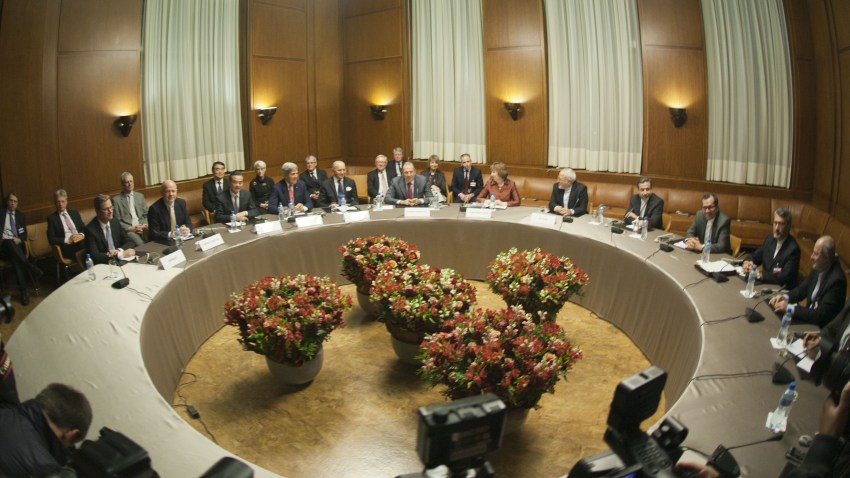Representatives from the six-country negotiating group known as the P5+1 and Iran met earlier this month for talks on Iran’s nuclear program that observers generally agree were inconclusive. As the parties prepare for the next round in Vienna June 16-20 and the July 20 deadline for a final agreement approaches, domestic forces in both the United States and Iran are trying to affect the goals and substance of a final agreement.
In particular, the arrest two weeks ago of six young people in Tehran who had appeared in an online music video in defiance of Iran’s public morality rules has highlighted the continuing influence of conservative elements in Iranian politics. A statement from the Washington-based National Iranian American Council condemned the arrest and
accused Iran’s hard-liners of “carrying out provocative acts like this one in a bid to cling to the status quo and keep Iran weak and isolated.” The six have since been freed on bail,
as has the video’s director, who was arrested separately.
Nevertheless, Iranian hard-liners, in particular those tied to Iranian Supreme Leader Ayatollah Ali Khamenei, have recently expressed support for the nuclear negotiations. Saeed Jalili, a Khamenei ally and member of Iran’s negotiating team,
wrote on Twitter on Saturday that “all must support the negotiating team to reach our aim of securing Iran’s nuclear rights”
and added that “the nuclear discussions are above and beyond narrow political and factional debates.”
Emanuele Ottolenghi of the Foundation for Defense of Democracies observes in a phone interview, however, that both hard-liners and moderates in Iran have pursued similar goals with regard to the nuclear program, which he calls “a constant staple of Iran’s national security policy for the last two decades.” He says that the differences between the two camps hinge primarily on the willingness to make nuclear concessions in return for sanctions relief.
Moreover, he cautions that rhetoric from Iranian leaders tends to be fluid over time and reflects divisions within the factions themselves. “Recently hard-liners [have been] falling into line and supporting the negotiators,” he says, “but the negotiators themselves are striking a harder line in public.” Ultimately, he says that whatever the shifts in Iranian rhetoric, on a practical level the United States “needs to be able to articulate an acceptable minimum” that Iran must be willing to meet to verifiably limit its nuclear program.
Internal debates in the United States continue as well. A bipartisan letter from U.S. lawmakers in both houses of Congress last week, for instance, underscored that the nuclear issue is merely the most high-profile item on a long list of U.S. grievances toward Iran. The letter’s signatories included Democratic allies of the administration as well as fierce critics such as presumptive GOP presidential aspirants Ted Cruz of Texas and Marco Rubio of Florida.
The letter expressed “grave concerns” about the “ongoing human rights crisis in Iran,” suggesting that despite positive statements from Iranian President Hassan Rouhani, the situation had “deteriorated” since he took office in August 2013. It
urged President Barack Obama to include human rights concerns as a “vital and consistent element” of current engagement with Iran.
Several lawmakers in the United States and Israel have also insisted that Iran’s missile arsenal—which would presumably be a delivery system of a hypothetical Iranian nuclear weapon—should be included in the negotiations. Secretary of Defense Chuck Hagel
said in a recent interview with Charlie Rose of PBS that if Iran built a nuclear weapon “they could probably” obtain the capability to deliver it with a missile “if they need to.”
Supporters of the administration’s specific focus on the nuclear issue argue that since Iran is certain to refuse to give up its missile arsenal, including it in the talks would doom them to failure.
Greg Thielmann
wrote in a recent essay for the Arms Control Association that “Iran has been adamant that it will not accept removal of the only weapons system it can reliably employ beyond the battlefield.” He said the issue of Iranian missiles would be better addressed by regional arms control measures.
Ottolenghi says that Iran’s missile programs are tightly bound up with the broader issues of illicit Iranian procurement networks and international sanctions and export control efforts. Accordingly, omitting Iran’s missiles from the negotiations would limit the ability of the United States to offer meaningful sanctions relief as part of a final agreement.
The administration, for its part, is pushing ahead with the negotiations and trying to keep its options open. In a background briefing with reporters after the most recent round of negotiations,
a senior U.S. administration official said that “there are no longer discrete rounds with opening and closing sessions, discrete set agendas. All the issues are on the table, and we are negotiating on all of them.”
Although the official confessed that the negotiations had been “a very slow and difficult process” and time was limited, “we believe we can still get it done.”

